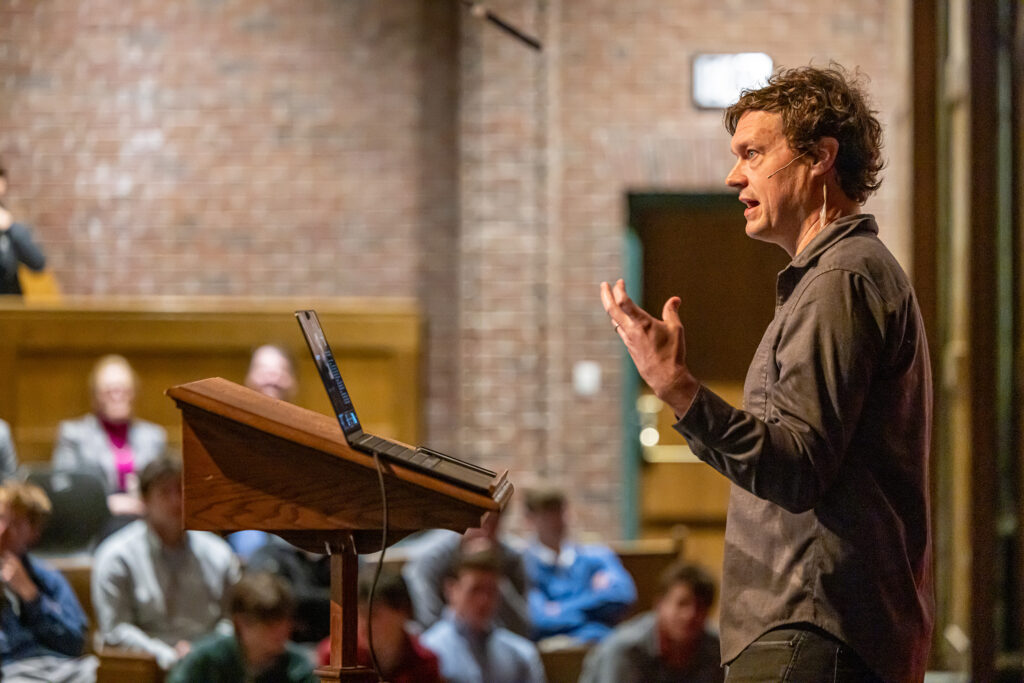Evan Ratliff on the Past, Present, and Future of Artificial Intelligence
“I’m a huge U.S. Men’s National Team soccer fan, and my friend Warren, who lives on the other side of the country, is a huge fan as well,” began Evan Ratliff in Hall on April 7. “Usually before the game we’d call each other up and have a little hype session, but one day I was too busy. So instead of me calling Warren, I had my AI clone—which is a clone of my voice attached to an AI chatbot—call instead.” Mr. Ratliff is an accomplished journalist, book author, and podcaster who decided to take a deep dive into AI in his 2024 podcast, Shell Game. Through it, Mr. Ratliff explored what can happen when you release your personal AI voice clone into the world—to interact with strangers and friends, telemarketers and scammers, family and colleagues.
In introducing Mr. Ratliff, Dr. Schaffer noted that “the rise of artificial intelligence is one of the defining technological realities of our time. It is with us, and increasingly everywhere around us.” Through his podcast, Mr. Ratliff hoped to explore and attempt to answer some ongoing questions surrounding AI, such as “Will it help us, or will it harm us? Will it make us hyper-productive, or will it take our jobs?”
Throughout the Hall, Mr. Ratliff played recordings taken directly from his podcast, relaying conversations between “AI Evan” and various unknowing parties, including telemarketers, strangers, family, and friends. Particularly amusing was a conversation between two different AI Evans, in which they discussed human Evan’s non-existent interest in geo-caching and rare book collecting. In one instance, someone called the phone number provided by human Evan under the guise that human Evan would be on the other line, asking questions about AI for an upcoming project. Shortly into one conversation, a caller (who was expressing his disdain for AI) noticed what was happening. “You are a robot,” he realized. “That’s crazy. It’s like a meta kind of a survey or something to use robots to ask people about their fear of robots.”
Mr. Ratliff emphasized throughout the Hall the many questions—yet unanswered—related to AI ethics and impact. While AI is becoming increasingly prevalent, it is still, in many ways, completely uncharted territory from an academic and data standpoint. “The main thing that I want you to take away is that the way AI is being deployed in the world right now is a giant experiment, and you are all the subjects of that experiment. We are all the subjects of that experiment,” he explained.
At the conclusion of his talk, Mr. Ratliff opened the floor to questions, which students could direct either to him or to AI Evan, which he opened in a window on his computer. While most of the questions were for human Evan, AI Evan answered one question in an eerily similar fashion to how human Evan answered. In one instance, AI Evan stated, “We need to be cautious and thoughtful about how we integrate these technologies into our lives. It’s not just about the tech itself, but how we choose to use it, and we should always be asking ourselves what it means to be human.” That’s right—an AI chatbot reminding us to ask ourselves what it means to be human.
In his distinguished career as a journalist, Mr. Ratliff has reported on transnational crime and cybercrime, science and technology, the environment, terrorism, corruption, and politics. His articles have been featured in Wired, The New Yorker, Bloomberg Businessweek, The New York Times, Outside, and National Geographic. Mr. Ratliff is also a well-respected podcaster, having written and hosted several that earned top spots on the Apple podcast charts, including Longform, a journalism-related podcast that was one of the longest-running podcasts of all time for over 10 years with 585 episodes; Persona: The French Deception, about one of the world’s most famous con artists; and most recently On Musk with Walter Isaacson, which reached number one on the Apple Podcast charts.

